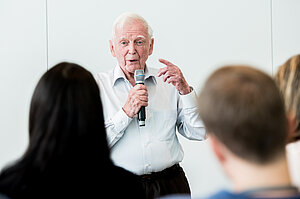Harald zur Hausen
* 11. March 1936 in Gelsenkirchen-Buer
1955 Study of Medicine in Bonn, Hamburg and Düsseldorf
1960 Conferral of a doctorate in Düsseldorf
1962 Medical Licence
1968 Assistant Professor of Virology at the University of Pennsylvania, USA
1969 Habilitation at the Julius-Maximilians-Universität Würzburg
Assistant and later chief assistant at the Institute of Virology in Würzburg
1972 Professorship at the Institute of Clinical Virology of the University of Erlangen-Nuremberg
Since 1974 diverse guest professorships in Australia, Brazil, UK and USA
1977 Professorship at the Centre for Hygiene at the University of Freiburg
1983 Director and scientific member of the managing-commitee at the Deutsches
Krebsforschungszentrum (German Cancer Research Centre) in Heidelberg
1988 Honorary Professor at the University of Heidelberg
2003 Professor Emeritus
Further scientific research
2008 Nobel Prize for Physiology or Medicine
In November 2018, the Universitätsarchiv Würzburg wants to continue to honour another Nobel Laureate as its “scholar of the month”. This time the physician Harald zur Hausen, who received the Nobel Prize in 2008 for his discovery of human papilloma viruses causing cervical cancer, will be presented.
The start of an outstanding career
After finishing the study of medicine at the Universities of Bonn, Hamburg and Düsseldorf, Harald zur Hausen received his doctorate at the latter and remained there as an assistant for few years. Thereupon, he went overseas in 1968, to work as the Assistant Professor of Virology at the Children’s Hospital in Philadelphia, USA. In 1969, the young physician returned to Germany, to habilitate at the Julius-Maximilian-University and to take over the position of an assistant, and later chief assistant at the Institute of Virology in Würzburg. Three years later, zur Hausen accepted the offer to take over the newly established academic chair of Clinical Virology at the University of Erlangen-Nuremberg as the professor and founding director. With another six years at the University of Freiburg, zur Hausen became the president and scientific member of the managing-commitee of the Deutsche Krebsforschungszentrum (German Cancer Research Centre) in Heidelberg and in this position assumed the leadership for 20 years
Continuing without aberrances
Since the 1960s, Harald zur Hausen spent a majority of his work on searching for a possible connection between viruses and cancer. For a long time this assumed link was widely doubted or even derided by other physicians. Nonetheless it did not demotivate zur Hausen, who determinedly kept on pursuing research. At the beginning of the 1980s, zur Hausen and his team managed to prove their thesis, by identifying different types of human papillomaviruses, which were made responsible for the development of cervix cancer. His researches are labelled as pioneering in the tumour-virology and enabled various new methods of prevention and treatment of cervix cancer – one of the most common cancers on women - such as the introduction of the HPV-vaccines in 2006. For his researches Harald zur Hausen, alongside Francoise Barré-Sinoussi and Luc Montagnier, was awarded with the Nobel Prize for Physiologie or Medicine in 2008.
A lifetime of cancer research
Even after being a professor emeritus since the year 2003, Harald zur Hausen dedicates his life to the research on the causes of cancer. Until 2009 he was Editor-in-chief for the International Journal of Cancer, as well as Vice-president for the Nationale Akademie der Wissenschaften LEOPOLDINA (National Academy of Science). Moreover, zur Hausen keeps on researching, like currently on a possible connection between beef-consumption and the emergence of colon cancer.
For his work and dedication, he was awarded several national and international Awards, as well as 36 honorary doctorates at Universities worldwide, seven honorary professorships, was elected in multiple academies and was honoured with the Großen Bundesverdienstkreuz mit Stern des Verdienstordens der Bundesrepublik Deutschland (Order of Merit of the Federal Republic of Germany).




